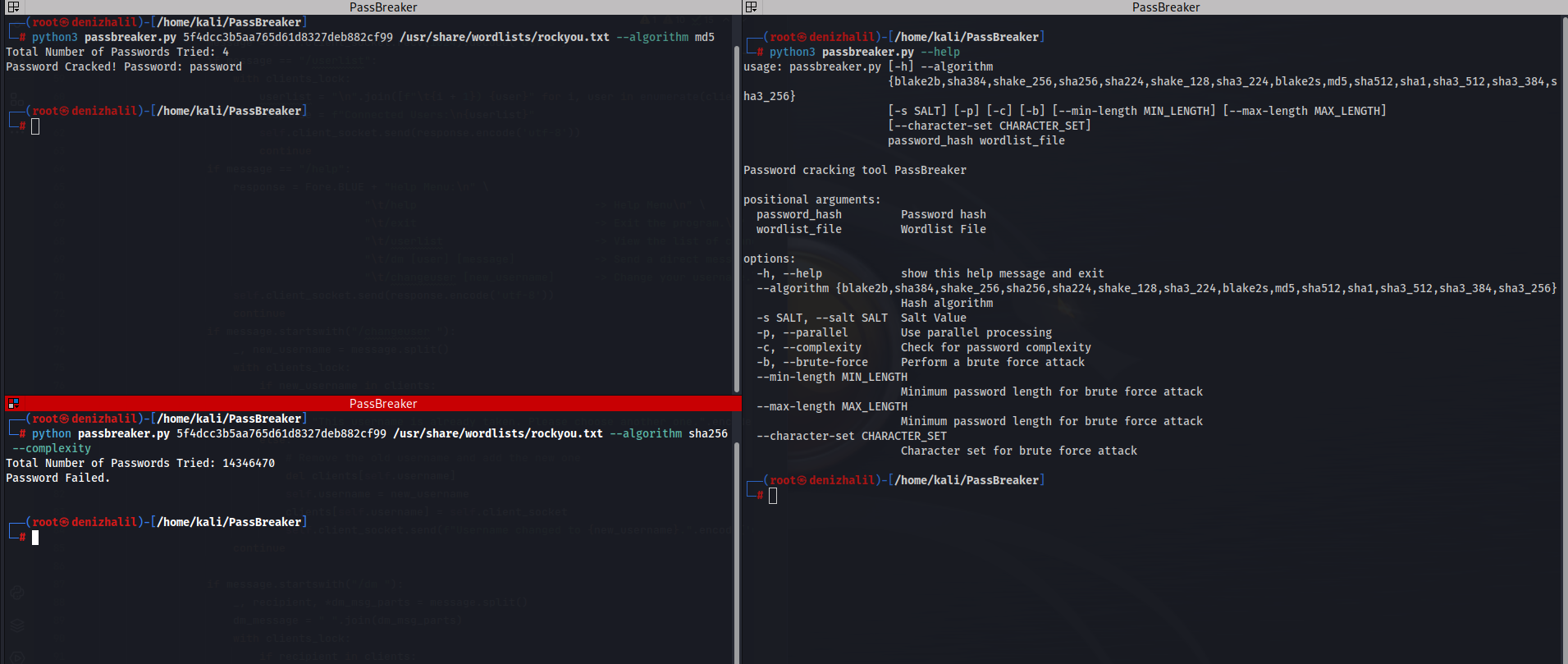PassBreaker is a command-line password cracking tool developed in Python. It allows you to perform various password cracking techniques such as wordlist-based attacks and brute force attacks.
Features
- Wordlist-based password cracking
- Brute force password cracking
- Support for multiple hash algorithms
- Optional salt value
- Parallel processing option for faster cracking
- Password complexity evaluation
- Customizable minimum and maximum password length
- Customizable character set for brute force attacks
Installation
- Clone the repository:
git clone https://github.com/HalilDeniz/PassBreaker.git- Install the required dependencies:
pip install -r requirements.txtUsage
- help menu
python3 passbreaker.py --help
usage: passbreaker.py [-h] --algorithm {blake2s,sha224,sha512,md5,sha3_224,sha3_384,sha3_512,sha256,blake2b,sha3_256,shake_128,shake_256,sha1,sha384} [-s SALT] [-p] [-c] [-b] [--min-length MIN_LENGTH] [--max-length MAX_LENGTH]
[--character-set CHARACTER_SET]
password_hash wordlist_file
Password cracking tool PassBreaker
positional arguments:
password_hash Password hash
wordlist_file Wordlist File
options:
-h, --help show this help message and exit
--algorithm {blake2s,sha224,sha512,md5,sha3_224,sha3_384,sha3_512,sha256,blake2b,sha3_256,shake_128,shake_256,sha1,sha384}
Hash algorithm
-s SALT, --salt SALT Salt Value
-p, --parallel Use parallel processing
-c, --complexity Check for password complexity
-b, --brute-force Perform a brute force attack
--min-length MIN_LENGTH
Minimum password length for brute force attack
--max-length MAX_LENGTH
Minimum password length for brute force attack
--character-set CHARACTER_SET
Character set for brute force attack
- Basic use
python passbreaker.py <password_hash> <wordlist_file> [--algorithm]Replace <password_hash> with the target password hash and <wordlist_file> with the path to the wordlist file containing potential passwords.
Don’t forget to read our article on wfuzz, the most used tool in the field of web pentesting.
Options
--algorithm <algorithm>: Specify the hash algorithm to use (e.g., md5, sha256, sha512).-s, --salt <salt>: Specify a salt value to use.-p, --parallel: Enable parallel processing for faster cracking.-c, --complexity: Evaluate password complexity before cracking.-b, --brute-force: Perform a brute force attack.--min-length <min_length>: Set the minimum password length for brute force attacks.--max-length <max_length>: Set the maximum password length for brute force attacks.--character-set <character_set>: Set the character set to use for brute force attacks.
Usage Examples
Wordlist-based Password Cracking
python passbreaker.py 5f4dcc3b5aa765d61d8327deb882cf99 passwords.txt --algorithm md5This command attempts to crack the password with the hash value “5f4dcc3b5aa765d61d8327deb882cf99” using the MD5 algorithm and a wordlist from the “passwords.txt” file.
Brute Force Attack
python passbreaker.py 5f4dcc3b5aa765d61d8327deb882cf99 --brute-force --min-length 6 --max-length 8 --character-set abc123This command performs a brute force attack to crack the password with the hash value “5f4dcc3b5aa765d61d8327deb882cf99” by trying all possible combinations of passwords with a length between 6 and 8 characters, using the character set “abc123”.
Password Complexity Evaluation
python passbreaker.py 5f4dcc3b5aa765d61d8327deb882cf99 passwords.txt --algorithm sha256 --complexityThis command evaluates the complexity of passwords in the “passwords.txt” file and attempts to crack the password with the hash value “5f4dcc3b5aa765d61d8327deb882cf99” using the SHA-256 algorithm. It only tries passwords that meet the complexity requirements.
Using Salt Value
python passbreaker.py 5f4dcc3b5aa765d61d8327deb882cf99 passwords.txt --algorithm md5 --salt mysalt123This command uses a specific salt value (“mysalt123”) for the password cracking process. Salt is used to enhance the security of passwords.
Parallel Processing
python passbreaker.py 5f4dcc3b5aa765d61d8327deb882cf99 passwords.txt --algorithm sha512 --parallelThis command performs password cracking with parallel processing for faster cracking. It utilizes multiple processing cores, but it may consume more system resources.
These examples demonstrate different features and use cases of the “PassBreaker” password cracking tool. Users can customize the parameters based on their needs and goals.
Disclaimer
This tool is intended for educational and ethical purposes only. Misuse of this tool for any malicious activities is strictly prohibited. The developers assume no liability and are not responsible for any misuse or damage caused by this tool.
Contributing
Contributions are welcome! To contribute to PassBreaker, follow these steps:
- Fork the repository.
- Create a new branch for your feature or bug fix.
- Make your changes and commit them.
- Push your changes to your forked repository.
- Open a pull request in the main repository.
Contact
If you have any questions, comments, or suggestions about PassBreaker, please feel free to contact me:

